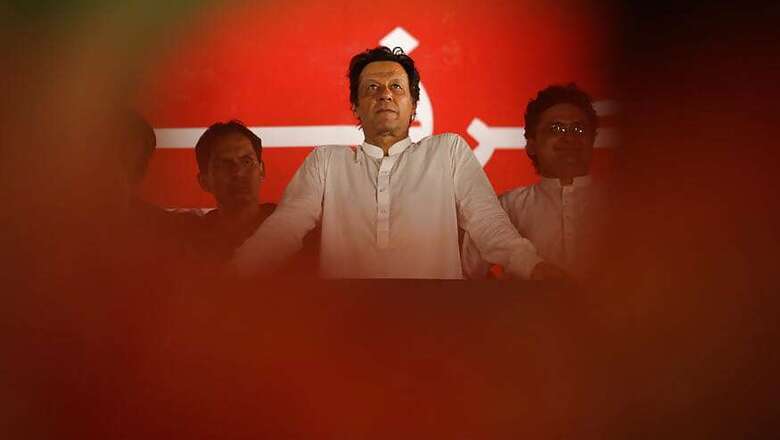
views
Now that dust is starting to settle on the strike that India claimed it carried out inside Pakistani territory targeting a Jaish-e-Mohammad (JeM) camp, some hard and contested facts are coming to light.
Pakistani military spokesperson broke the news himself, but chose to say that it was an attempt that Pakistani air force foiled and that they were able to pursue the Indian jets back into their territory. And while they were leaving, they dropped a payload, which basically means a bomb, as later clarified by the Pakistani Defence minister in a press conference.
On the other side, India claimed multiple JeM operatives were killed in the strike. But the truth lies somewhere in the middle. On-ground reports via independent sources have confirmed that there is a Jaish-e-Mohammad seminary in the area. Whether it was hit or not is what is being contended.
There is no denying that Pakistan has JeM camps spread across the country. Just recently, the government in its own circular referred to the seminary that it took over in Bahawalpur as the JeM headquarters. In the past, it has acknowledged that Lashkar-e-Taiba, another Kashmir-focused militant group that carried out the Mumbai attacks, was organised on Pakistan soil. And it is not just India. Afghanistan has also accused Pakistan of aiding terror acts, and Iran recently also levelled similar accusations against Pakistan after at least 27 Iranian Revolutionary Guards were killed by a Sunni militant group in the country's region bordering Pakistan.
India, Pakistan and the world know all this.
But this time around, what is different is that India came into Pakistani airspace and dropped a bomb on Pakistani soil across the international border. Although the strike was done through conventional warfare, the Pakistani military spokesperson made an obvious reference to the National Command Authority (NCA) in his press conference on Tuesday, and it appears that he did so to remind everyone of the nuclear option Pakistan has, given that NCA looks after the nuclear program.
India and Pakistan, since the late nineties, when they went nuclear, have not seen a full-fledged war, or direct confrontation, except in 1999 when the ill-planned Kargil adventurism occurred, but even that ended prematurely before turning into a full-blown war.
But ever since the two neighbours have gone down nukes-route, the non-state actors appear to have become more belligerent. Islamabad, rather Rawalpindi, which control Pakistan's security policy believes that non-state actors can carry out the conflict with India and in return the Indian threat can help the military justify its over-sized presence in Pakistan.
But India has not changed that equation.
India has now set a new precedent – that they will attack or at least attempt to attack targets inside Pakistani territory. This puts those in charge of the country's defences in a spot – as now they actually have to defend the country. And if one goes by previous records, Pakistan has lost all wars with India, and given that it is outnumbered and under-equipped, there is very little chance Pakistan can ever win.
So how will Pakistan respond? It appears that currently the military is managing the domestic audience by narrative control using the media and the government, and saying India is lying about hitting any targets so there is nothing to respond to. However, the military spokesperson also hinted at a surprise response, without giving any further details. What will Pakistan attack, if it does?
It appears Pakistan currently has no coherent policy of how to respond as it has been taken by a surprise. But it actually was not a surprise, given that India conducted an operation across the Line of Control in Kashmir only a few years ago in 2016 when it claimed that it carried out a surgical strike. Local investigations reported at that time that the Indians did come in and hit Pakistani military posts, and maybe a militant hideout but there was nothing “surgical” about it. And Pakistan at that time had also denied that it happened, saying India was lying. This time around it has at least acknowledged violation of its airspace. But given that Pakistan's sovereignty has been challenged, it is most likely that the country will respond. There are chances that it may respond using non-state actors, which can further escalate the tensions between the two.
But instead of escalating in any manner whatsoever, Pakistan should look within to see why it continues to have a terror problem. If it is by design and being run by Rawalpindi, as alleged, than the country's elected leadership should question its military and finally put an end to such a policy because now it has come down to the final stage.
It should also ponder why Pakistan as a country stands alone in the world, with many other countries besides India demanding that Pakistan must address its terror problem. Pakistan must introspect and revisit its security policy that has isolated it in the region, and around the world. In that lies its progress. Otherwise, it is doomed.
(The author is a Pakistani journalist living in exile in France. He tweets @TahaSSiddiqui. Views are personal)













Comments
0 comment